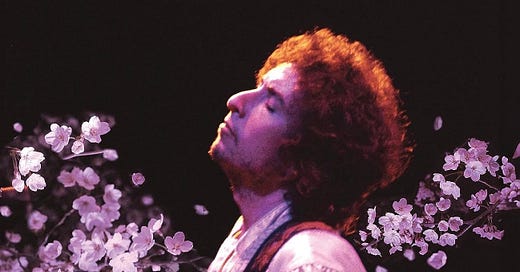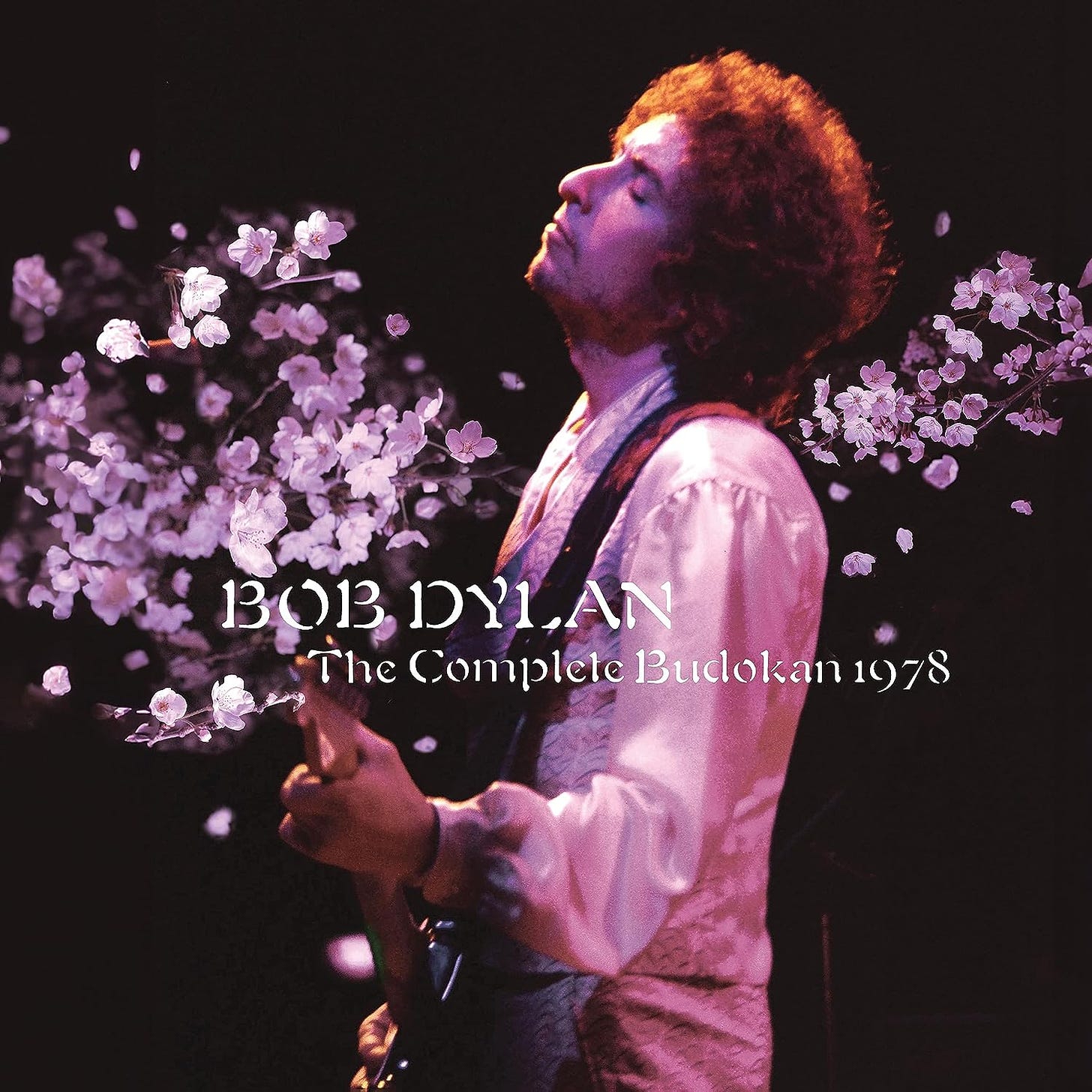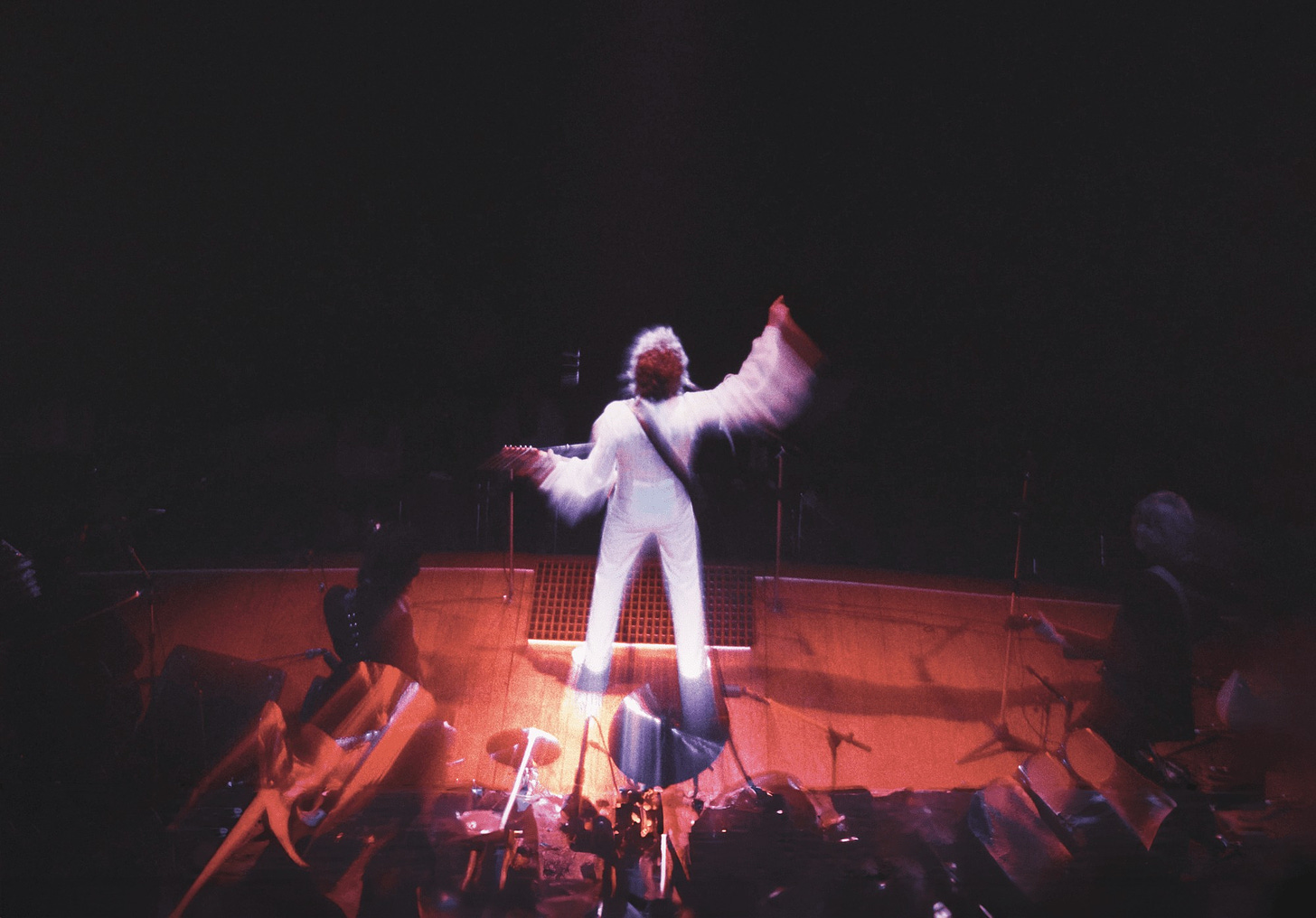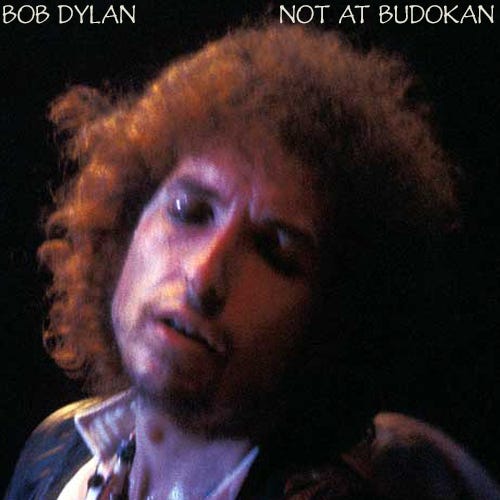
Flagging Down the Double E’s is an email newsletter exploring Bob Dylan concerts throughout history. Some installments are free, some for paid subscribers only. Sign up here:
Today, Bob Dylan’s Complete Budokan 1978 box set shall be released. Having had a promo for a bit, I’ve put together a ranked listening guide to the new songs—that is, the songs that were not included on Dylan’s original At Budokan live album.
There are eleven such songs, several in multiple versions. A couple are covers, but most are originals, wildly rearranging tunes from his early Freewheelin’ era through Blood on the Tracks for this enormous 12-piece band. (These Budokan shows took place before Street-Legal was recorded, so none of those songs appear among the newly-added ranks.)
“Dylan goes Vegas” was the dig at the time of a show complete with backing singers, sax solos, and flashy white jumpsuits. But I’ve been an At Budokan defender for years now, and a number of the selections on this new set are every bit as good as the songs on the original record. The only real complaint I have is, it’s a shame material from later in the year couldn’t be included, since the songs and setlists changed fairly dramatically over the 100+ shows. But I imagine these are the multi-tracks they had sitting in the vaults, the shows they professionally recorded for the original Budokan album.
The two shows on offer come from early in the year-long 1978 tour, recorded February 28 and March 1, 1978 at the titular Nippon Budokan Hall in Tokyo, Japan. The full box set includes both shows in their entirety. But good news for everyone who didn’t shell out for the entire thing: The slimmer Another Budokan 1978 collection includes every one of these new songs.
Let’s dive into the new songs as we enter the Budokan Extended Universe, ranked from the worst to the best.
11. Repossession Blues
Throughout the 1978 tour, Dylan opened many shows with blues covers. He did songs by Tampa Red, Muddy Waters, Robert Johnson, and more.
It often proved an awkward fit. His largest, flashiest, glammiest band ever was a poor choice to act like he’s playing a rough and rowdy blues club in 1950s Chicago. “Repossession Blues,” for instance, doesn’t make good use of around two-thirds of the band members. The backing singers, stars elsewhere, make nary an appearance, and most of the instrumentalists choogle along generically. The only real standouts are saxman Steve Douglas tooting along and guitarist Billy Cross shredding several killer solos. The 1988 four-piece band would be more suited to doing gritty old blues songs than this 12-piece from a decade prior.
10. To Ramona
The weakest of the rearranged Dylan originals is a big one for the other singers, who blast the backing vocals, taking the second and fourth lines of every verse in a neat alteration with Dylan doing the first and third solo. By the end though, that inventive three-note melodic riff that gets traded between the instruments (piano, guitar, sax) gets a little tiresome. Even the instrumental breaks just play that same little riff over and over. What starts the song as a fresh approach ends the song feeling stale.
9. Tomorrow Is A Long Time
Fair warning: We’re only three songs in, and by this point I pretty much like all of ‘em!
One thing that jumps out from this set is just how powerful Dylan’s singing is. You’d think a giant band might swamp him, but he belts the hell out of a ballad like this. Is he echoing Elvis here, who Bob was so pleased covered this song a few years earlier? The musical arrangement is a little lumbering—the reason it’s ranked so low—but dig that big sax solo from Douglas, and the singers sound great. That’s gonna be come up a lot here: Steve Douglas rules, the singers (Debi Dye, Jo Ann Harris, Helena Springs) rule. Keep an ear tuned to the left channel too for some beautiful piano fills from Alan Pasqua.
8. Love Her With A Feeling
The other blues cover of the set towers above the first, and for one simple reason: This one has the backing singers on it. Douglas still toots, and Cross still solos, but the addition of the other vocalists elevates this. It feels more crafted for this band, rather than shoehorned in.
Incidentally, when I interviewed Cross, I asked him about these blues covers:
If I remember correctly, he would just start them. He wouldn't say anything; he just starts those songs. It'd be 22,000 people out there and we'd be all set up and you'll hear [him play] dun-dun-dun-dun-dun and you think, “Okay, here we go.” I love that. I absolutely adore that. We have a word in Danish, it's so perfect for it, it's befriende, and it means that it frees you up, it allows your air under your wings. When somebody in front of 22,000 people has the confidence and the will to just start a song and the trust in his band to do it.
You probably knew all those songs already, right?
No! Most of them I knew, but I'll tell you something, Bob would pull these things out, "Hey, have you ever heard of--" He'd give some name I've never heard of in my life and I’d go home to the hotel. There was no internet back then, so I'd call up some people I knew and say, "Hey man, have you ever heard of Blind Melon Chipman?” or whatever it was.
7. A Hard Rain's A-Gonna Fall
It’s probably sacrilege to rank so high the one song here that Bob Dylan does not even appear on. This opening number served to warm up the crowd before he ambled onstage near the end to launch into the night’s blues cover (later in the tour they did a similarly instrumental “My Back Pages.”) It’s fun to hear the lead instrumentalists getting a chance to shine, passing the baton from Steven Soles on capoed acoustic guitar to Douglas on sax to Pasqua on organ to Cross on electric guitar to David Mansfield on violin.
6. I Don't Believe You (She Acts Like We Never Have Met)
It used to go like that…and now it goes like this…and now it goes like this other thing. “I Don’t Believe You,” one of the first acoustic-era songs to get a radical electric reinvention, gets reinvented yet again. It sways along, buoyed by Mansfield’s mandolin and Douglas’s sax, which quietly plays in the background before erupting into a giant solo. No backing singers on this, but it doesn’t need it: Dylan himself does enough killer singing for a dozen people. Just listen to how many notes he squeezes into the word “wet” around the ninety second mark.
5. One Of Us Must Know (Sooner Or Later)
The backing singers are back, no pun intended, and they fully steal the show. Love them boisterously chiming in at the end of Dylan’s lines (“so bad!,” “so sad!,” “understood!,” etc). Also a nice showpiece for pianist Pasqua rollicking along like he’s playing in an old-timey saloon and drummer Ian Wallace, who gets some big fills going into the chorus.
4. You're A Big Girl Now
This minimal slow blues starts quiet and subdued even with the giant band, but bursts forth with a repeated three-chord riff. It’s the Vegas-band version of the Pixies’ loud-quiet-loud dynamic. Pasqua’s piano lines back Dylan, who delivers his most understated vocals of the set. Listen to his delivery of “See what you can do” at 2:35. Only knock is that perhaps the sax perpetually blowing along in the background is one thing too many here.
3. The Man In Me
The lead single released when this set was announced, and for good reason. It showcases everything us 1978 partisans love about this era: a wildly theatrical arrangement, the backing singers in their full glory, the huge band firing on all cylinders, a blaring sax solo, and above it all Bob belting the hell out of it.
2. Girl From The North Country
The second-best song of the new set is the quietest of the lot. It features Pasqua on organ, Douglas on sax, and Dylan singing and playing guitar. That’s it.
The stripped-down setup allows him to sing particularly nuanced vocals. It’s one of the few tracks here when I’m not tempted to use the verb “belt.” Pasqua told me this was one of his favorite tracks to play every night:
Every night for the better part of that year, he and I played two duets [“I Want You” and “Girl from the North Country”]. I looked forward to those two duets every night so much because it was a moment just for me to be alone and play with him and get to do a little bit more than I would normally do as a keyboardist in the structure of the band.
And, finally, my favorite track amidst some stiff competition…
1. I Threw It All Away
Compare this version to the one on Hard Rain, on his previous tour. That one is enraged, biting, vicious. It’s a powerful but tough listen.
One tour later, it’s smooth and polished. The anger is long gone, replaced by resignation. The backing singers echo the title line at the end of each chorus and coo softly during the bridge. Dylan is able to both sing nuanced lines at parts and, yes, belt when necessary. Sometimes he manages both at once, nuanced and loud; listen to both the “take a tip from one who’s tried” deliveries at 2:26 and again at 4:18.
After you’ve listened a few times, focus in on individual instruments. In particular, Pasqua on organ in the left channel levitates, while Douglas in the right delivers his most beautifully melodic sax solo.
But, ultimately, like most of this set, the star is the vocals: both Dylan’s and the other singers. It’s his Elvis-in-Vegas era, and he sings to reach the farthest reaches of the arena, with three badass women pushing him forward.
Want more 1978? Check out my 46-track compilation of later songs from that year, titled NOT At Budokan:
Not At Budokan
I had fun a few months ago compiling a Before the Flood companion set, so I decided to do the same for one of my favorite Dylan live albums, 1978’s At Budokan. Today’s the anniversary of the beginning of the second full leg of the 1978 mega-tour…











Well, damn, this is just about enough to make me interested in '78 ! I've never been on board - I'm a bit unusual in that I'm becoming almost exclusively a fan of NET Dylan. Of course, I love much of what came before the NET, but in terms of concerts, '88 onwards is almost all I listen to these days.
But these cuts do sound great. Maybe I needed to do what you did here, which is take it song by song, and focus on the individual players.
Also, has Bob ever been more committed vocally? Maybe so, but these shows are probably in his Top 5 Most Vocally Committed Years, I must admit. He is bringing it.
Imagine the ovation Bob would get today, if he iintroduced a saxophone or a flute.
I’ve always enjoyed him mixing it up.
Fwiw I still think we will get a ‘78 Bootleg Seties. This release is very much an anniversary celebration of Bob’s first trip to Japan.
I was lucky to catch him in Osaka earlier this year. He clearly holds the country with special affection.